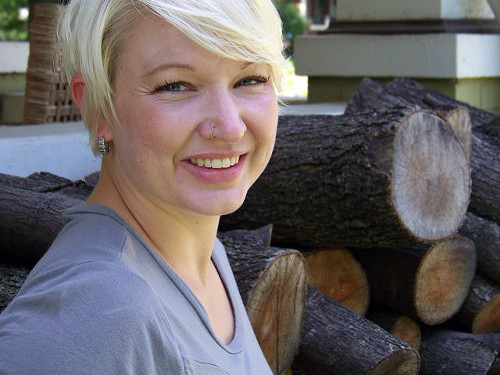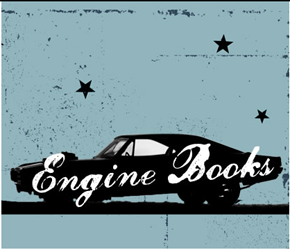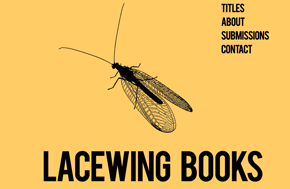An Interview with Victoria Barrett,
Publisher of Engine Books
by Karin Cecile Davidson

Victoria Barrett, editor and publisher of Engine Books, is invested in literary worlds. A writer and a professor at Ball State University in Indiana, she also coedits Freight Stories, an online journal of contemporary fiction, with her husband, Andrew Scott. In addition, Lacewing Books is the young adult imprint of Engine Books, edited by Scott, and EB2 is the reprint line in paperback and e-book from Engine Books. The serious task of editing, design, and author- and story-centered publishing, as well as the commitment to publishing writing by women, is taken to new levels by this boutique press. To date, EB has published sixteen titles, including two of the books discussed in this issue of Newfound Journal: “You Are Free to Go” by Sarah Yaw and “Echolocation” by Myfanwy Collins.
Every book deserves close editorial attention at every level. –Victoria Barrett
KARIN CECILE DAVIDSON: Victoria, you are interested in publishing novels, short story collections, collected novellas, and memoirs. Please tell us about your process of selecting books and working with writers, from submission to publication, especially in terms of your pledge to publish books by women.
VICTORIA BARRETT: EB titles come in via regular submission (we use Submittable) or through our annual fiction prize contest. I sometimes consider work pitched by agents. We do not generally solicit books. At first, I received a very wide range of material because the press hadn’t published enough for writers to get a strong sense of what I do and do not like. Submission guidelines are helpful in this regard, but only to a limited degree.
But these days, I receive a steady supply of more great submissions than I could ever possibly publish. That’s sad, to me, to have to say no to so much good material. But Engine Books is small and will remain so for the foreseeable future, so there’s only so much I can take on.
I read to say yes. If I’m looking at submissions and I catch myself in a mood where I want to say no, where I’m looking for reasons to say no, I stop reading because the joy of this work, the point of it, is to say yes to writers who’ve worked so hard on their books and who, by the time they send material to a small press, have been waiting a long time to hear that “yes.” Certainly the choices of every editor are functions of that editor’s taste, which is entirely personal and arbitrary, and there’s a lot of material I won’t say yes to. But there’s plenty that I will.
When I say yes, I try to provide the author with a fairly close reading of the work. The author’s job, then, is to decide whether my reading of the work matches their vision of the work. If it does, we work out a contract and begin editing, and I design a cover.
The editing process varies from book to book. Some books are edited in three phases: structural and/or global revisions, scene or chapter-level revisions, and line edits. In some cases, any two or three of those steps might be combined. Copy editing and proofing happen, as well, of course.
Once we’ve worked through the material to make it the best book it can be, promotion kicks in. I send between 150 and 200 ARCs out to bookstores and reviewers plus provide digital ARCs through the Edelweiss system. I ask the authors to do everything they can to promote online, whether that’s through placing excerpts, being interviewed, participating in social media, or blogging. We try very hard to involve the author at every juncture, but to focus on the author’s strengths. So if, like me, they’re not thrilled about or great at Twitter, that’s okay—we can skip that component, for example.
By the time the book comes out, we’re mostly done. If the author is great at giving readings and talks and has scheduled those, we spend PR time promoting and supporting those events, and we continue to push opportunities for publicity, including following up with reviewers as the book rolls out.
Through all that, I didn’t speak to the last part of your question, largely because the processes of selection, promotion, and publication aren’t—or shouldn’t be—much different from one author to the next. Of course that doesn’t hold entirely true. We know from VIDA’s good work—and from basic observation—that women authors aren’t reviewed at the same rate as men, so books by women, which make up most of what EB publishes, require a bit more aggressive follow-up and push to get attention.
One thing that’s been interesting and often disheartening about the gendered component of Engine Books is the response from men in the literary world. It’s worth noting that EB has never said it will publish mostly women or only women. The promise is simply that the press will publish a minimum of 50 percent women. Since we can all do basic arithmetic, it’s clear that 50 percent isn’t even parity—the general population is about 51 percent female. Yet I’m frequently called sexist by men or accused of lowering my standards to reach this goal. The defensiveness at play and the fragility of these male-writer egos are just astounding to me—and a bit pathetic. Men are welcome to create their own spaces in the literary world, or they could just remain within the mainstream spaces that are occupied primarily by men anyway, but instead, they make a point of attacking anything that isn’t made specifically with them in mind. (Sometimes they’ll even do a version of this in query letters, which is particularly helpful in weeding out their work.)
The fact is that the vast majority of excellent manuscripts I receive are from women writers. That might be because great women writers are drawn to a press that makes such a promise, or it might be for other reasons. I do receive submissions from men, and I’ve published some wonderful books by men. But the best submissions I receive are usually from women. That’s probably because of that taste-based subjectivity I mentioned above: I’m most interested in the stories of women’s lives. Not exclusively, for sure, but mostly.
Work is selected by the quality of its storytelling and edited with an eye toward enhancing that storytelling. –Victoria Barrett
 DAVIDSON: Your dedication to the literary world is inspiring, and as an enthusiastic supporter of EB, and small presses in general, I have to thank you and Andrew. The logistics of balancing teaching, writing, editing, and running a press must leave you breathless at times. How do you manage this balancing act?
DAVIDSON: Your dedication to the literary world is inspiring, and as an enthusiastic supporter of EB, and small presses in general, I have to thank you and Andrew. The logistics of balancing teaching, writing, editing, and running a press must leave you breathless at times. How do you manage this balancing act?
BARRETT: Thank you! I like to joke that Engine Books is what I do for fun. Now that I have a baby and another on the way, that’s a bit less true—lots of days I just want to hang out with the kid all day. And many components of the job of running a press aren’t fun. I spend a lot of time communicating with our distributor, for example, and could spend a lot more if I had it. I love paying royalties to authors, but I’m not enamored of the full day of tabulating sales and payments each quarter. The work of publicity is repetitive and sometimes unpleasant. So if I’m honest, editing and cover design are what I do for fun. The rest would be a lot more palatable if I were paid for my work at the press, but the budget doesn’t cover salaries at this time, and never has, so that’s work I have to force myself to do. But this struggle to make time is managed, as the press is concerned, largely by keeping the list small. In a perfect world, book sales would cover a salary so I could teach less and devote more time to the press, but small presses face burdens that big publishers do not. For example, we pay a substantial portion of our sales income to our distributor for their services, whereas a big, self-distributed publisher gets those services at cost. So at present, a salary that would help balance the workload is not in the budget.
Teaching is a great way to pay the bills—the academic schedule is wonderful for editing and for parenting—but it’s not a calling to me. It’s my day job, and I work very hard to be good at it, but it lives in that context of a day job. It’s regimented and scheduled, and I do my best to keep it confined to the forty hours a week I’m paid to do. Some weeks that works out better than others.
Frankly, it’s usually the writing that falls by the wayside. There are only so many hours in a day, and lately I’m tired during most of them. During winter break and summer, that workload shifts, of course, and the teaching time is distributed to the press and the writing. But during the academic year, you’re right: finding the balance is extremely difficult.
A book is much more than a container for ideas. As a finished product, it should be an artifact representative of the power in its pages. –Victoria Barrett
 DAVIDSON: Do you have any anecdotes about your work as a small-press publisher and editor, whether on the side of working relationships with writers or navigating the challenges of the publishing world?
DAVIDSON: Do you have any anecdotes about your work as a small-press publisher and editor, whether on the side of working relationships with writers or navigating the challenges of the publishing world?
BARRETT: As I mentioned previously, small presses face substantial financial barriers that larger publishers do not. Figuring out where the money will come from is my biggest challenge, even bigger than balancing my time. Small print runs mean much more expensive production costs; distribution is expensive; marketing can be expensive in these small batches. (Where the money comes from, too frequently, is our family budget.) Two conflicting dynamics impact small presses in this larger realm, both of which are, in some ways, related to that financial challenge. First, publishers of all stripes are pretty widely vilified in the larger book world. A bookstore that sells an Engine Books title at cover price makes at least four times what the press makes off a copy of that book, but in the wider discussions of publishing (and self-publishing), the industry’s problems have generally been laid at publishers’ feet without much discernment.
The second dynamic is the lionization of small presses over big ones—the idea that we’re all heroes for doing this work. It’s true that many of us serve as volunteers, seeing little tangible benefit in our own lives for that work. But not all small presses are created equal, either. Both the vilification and the praise get applied indiscriminately when, frankly, small presses and big five publishers are simply different animals and should be discussed as such.
The blurring of these lines in public discourse is frustrating, if not necessarily concretely consequential. But from time to time, an agent or an author will behave as though that distinction isn’t real or doesn’t matter, expecting this volunteer-run press with a self-funded budget to behave as though we have full-time staff and a big corporate budget, which results in expectations—demands, even—that aren’t appropriate for this particular professional relationship. Sometimes that means an approach that’s needlessly combative or defensive. Sometimes it means disappointment and hurt feelings. Mostly, though, it means that the experience of getting the book out into the world isn’t the ideal one that we usually have.
The vast majority of working relationships through Engine Books have been wonderful. Many of the EB authors have welcomed me into their lives in ways I could never have expected and have become good friends. And I’ve loved watching them support and become friends with one another, as well. But this larger book culture and these widespread attitudes about publishing do sometimes impact the work we do as publishers, and that impact can be difficult to mitigate. That’s not an anecdote, I suppose, but it is an important consideration that we probably should all be talking about in more thoughtful and specific ways.

Karin Cecile Davidson, Interviews Editor

0 comments on “Interviews: Victoria Barrett”